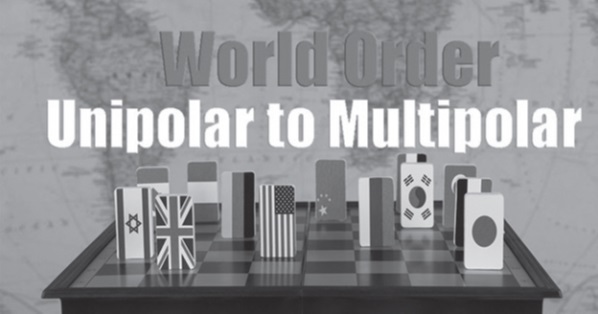
BY ADDISALEM MULAT
The era of cold war was characterized by bipolar world divided along liberal and socialist camps. However, the collapse of the Soviet Union on December 31, 1991 had led to the emergence of unipolar power in the world. On the basis of its economic muscle, the United States of America has long become the world’s most powerful nation which many described it as the policeman of the world. The world has since lived through a unipolar period when the United States enjoyed an unchallenged worldwide supremacy.
Decades later, the world has seen the emergence of new world powers and regional players heralding the onset of multipolar world. Nations like China, India, Russia, Indonesia, Turkey, and Brazil have come to be emerging powers with fast and expanding economies.
The new phenomena present the continent of Africa with plenty of economic, political and military cooperation opportunities. Multipolar world in fact provides weak nations to look for better advantages and diverse alternatives.
In a unipolar world, where power is concentrated in the hands of a single nation, countries are more likely to be heavily reliant on the superpower. This makes the weak states including African nations to be vulnerable to foreign interference and pressure the result of which is imposition of cultural imperialism and infringement of sovereignty.
Similarly, numerous IR neorealists consider unipolarity as a wellspring of potential insecurity and risk which in the end leads different actors to attempt to offset the dominating force (hegemon) utilizing either hard or soft power. A few researchers restrict themselves to only the precise hierarchy of the unipolar world guaranteeing peace and strength. The majority of them concur that in the long haul the dispersion of force and the increasing expenses will cause decay to the unipolarity which as a result will undermine the authority of the sole power of present times. But above all, it is less developed world that comes under huge impact in unipolar world.
African nations including Ethiopia have been among the victims of foreign interference in unipolar order. Nowadays some countries are meddling in the internal affairs of Ethiopia.
The interference of the United States has been practically witnessed at the time when the dam talks between Ethiopia, Egypt, and Sudan was held. When the negotiations failed, former President Donald Trump ended up saying Ethiopian stubbornness over the Renaissance Dam crisis could push Egypt to blow up the dam. In broad daylight, the President took sides with Egypt and spared no effort to twist its arm.
The same thing is happening in the present circumstances regarding the law enforcement operation undertaking in the Tigray region. The Federal government of the United States is very much aware of the fact that the TPLF Junta clique attacked the Northern Command of the Ethiopian National Defense Force and caused inconceivable human misery. But the U.S. and other countries are trying to put maximum pressure on the country. The involvement of some countries have been visible in the UNSC; however, a proposed resolution has been blocked by Russia and China. This is a stark indication that multipolar world provides opportunities to countries to forge strong alliances with different power players.
Countries in the east and south of the world have already emerged as the new power players owing to rapid economic growth as unipolar world continues to decline. The rise of China as superpower, and the formation of BRICS are leading to unfolding of multipolar world. This trend widens economic, political and social opportunities. On regional premise, numerous states are surely prepared to supplant the U.S., others might aspire to the role of great power in the future.
In succeeding decades China can financially and militarily overwhelm the U.S. India is among the ten quickest developing economies of the world since 1980 and it is anticipated that in the next decade its development rate would rise to the level of three major powers.
In the future multipolar world, it may be assumed that global system is not going to rest with a couple of significant nations but rather with numerous nations with varying capabilities. Every state having its particular noticeable qualities will have a decisive say in the limited arena of affairs pertaining to its region. Other than the US, Japan, China, EU and India are capable of economic potency owing to their technical advancements, growing economy and wide base of population. Iran, Saudi Arabia, Venezuela and countries from the African Union and Brazil would have impact because of their considerable energy assets. Russia would have both preferences. A few nations would have some regional significance because of their geostrategic location like Pakistan, Central Asia, Ukraine and Turkey as these nations are situated on the energy routes through which energy resources will be on the course to some parts of the world.
But striking a balance in the multipolar world requires states to devise sound foreign policy and smart diplomacy.
Many analysts believe that the international system is sliding towards multipolarity, a world in which no single great power is in a position to dominate its peers. But among those who subscribe to this view, there is some debate over just how the coming multipolar order will operate. Will great powers work together to uphold order? Will they instead descend into military and economic competition with one another? Or can planet Earth support multiple world orders, co-existent yet separate, each under the sway of a particular great power, asked Peter Harris, an assistant professor of political science at Colorado State University. There are no iron-clad answers to these questions. Yet current geopolitics does, perhaps, allow for a glimpse into the future, he added.
The commercial race over Africa, played out these days between the West and China, exemplifies the centrality of Africa to the multipolar world context. Economically and politically, the continent has been oriented towards Europe for ages due to obvious geographic reasons.
The position of regional states, which influence the range and change of the international system, is very difficult to comprehend. The general outlines of what is happening with this phenomenon are becoming more evident, as transition happens under intense internal dynamic conditions and not from external factors. There is a group of candidates that can be considered growing powers, and there are rapid bursts in this phase of transition, but it is longer than expected. Under conditions of changing institutionalization a central component of these changes occurs. Yet there is also a gap in the assumptions regarding the principles of collaboration and conflict.
National interests and principles are certainly the most significant in the changing world order. Ethiopia in this regard needs to strengthen its diplomatic relations with countries in the region and beyond. It should also forge tactical and strategic alliances with regional, continental and world powers in different frontiers so as to avert the imminent threats it faces and make use of the opportunities.
The Ethiopian Herald March 19/2021


